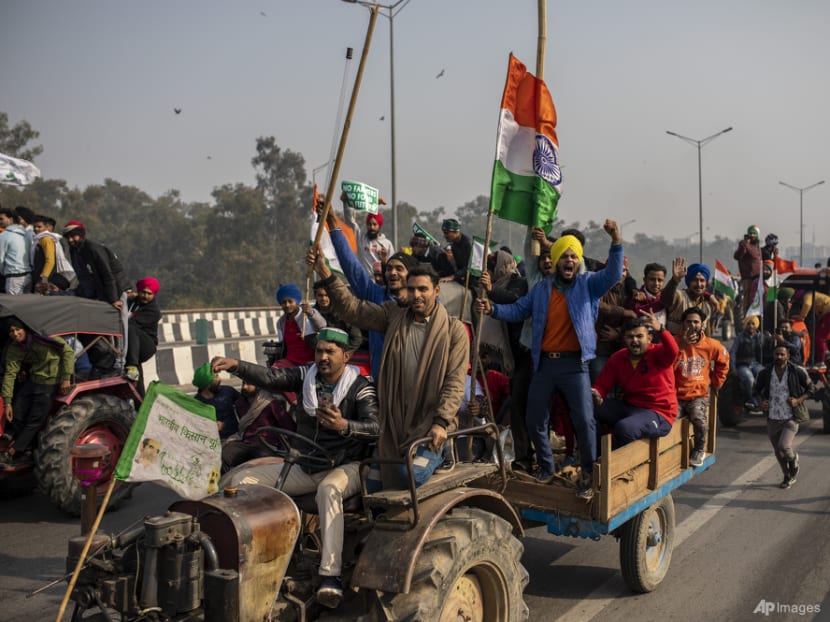Why Modi made a U-turn on changing India’s farm laws

More than a year of angry and sometimes deadly street protests by India’s farmers have forced Prime Minister Narendra Modi into the biggest retreat of his seven years in office: The repeal of his attempt to fundamentally overhaul the way farm goods are produced and sold in the nation of almost 1.4 billion people.
New legislation would have opened up a decades-old system of state-run wholesale markets to more private sales.
But farmers and opposition politicians argued it would leave those working the land vulnerable to exploitation.
In a country where more than half the people depend on agriculture for their livelihood - and with key provincial elections approaching in early 2022 - it was a message Modi apparently decided he could no longer ignore.
WHAT’S THE ROOT OF THE PROBLEM?
Farming has remained relatively untouched by the push to modernise India; its growth has consistently lagged behind the overall economy for years - often significantly. The poverty rate in rural India is about 25 per cent compared to 14 per cent in urban areas, according to World Bank data.
Many farmers rely on the most basic of technologies and own small landholdings that preclude economies of scale. And the wholesale markets they sell their produce into are often disorganised at best, dysfunctional at worst.
In some, the federal government’s buying programme does not operate, leaving private players as the only option.
WHAT WAS THE NEW APPROACH?
Parliament in 2020 passed legislation that the government said would boost farm output and income by removing many restrictions on sales.
Farmers and buyers would have been free to trade outside the physical markets designated in each state - at farm gates, private warehouses, processing plants or even on new electronic platforms.
The government said farmers would be more willing and able to invest in modern technologies and better seeds if they have an assured income or can get an advance from the buyer.
India is the world’s biggest cotton grower and ranks second in wheat, sugar and rice.
WHAT WENT WRONG?
In a televised address to the nation on Nov 19, Modi said he had failed to get his message across.
“The objective of the three farm laws was that the farmers of the country, especially small farmers, should be strengthened, they should get the right price for their produce and maximum options to sell the produce,” he said.
“Such a sacred thing, absolutely pure, a matter of farmers’ interest, we could not explain to some farmers despite our efforts.” He said the laws would be quickly repealed.
Related:
WHAT WERE FARMERS AFRAID OF?
Mainly, they feared the demise of the government’s guaranteed purchases of certain agricultural products at set prices. That could have resulted in wild fluctuations in a country prone to weather extremes.
Although the government sets price floors for more than two dozen crops, it mainly buys wheat and rice for its welfare programmes and some pulses and oilseeds to prevent distress sales by farmers.
The guaranteed prices are used as benchmarks for various farm commodities, but private buyers do not have to pay them.
Farmers also said the laws could have caused higher costs and more farmers losing their land due to increased debts, adding to a problem of suicides among agricultural workers.
WHAT HAD THEY DONE?
Tens of thousands had set up camp outside the capital, blocking a major roadway. The protesters had been insisting that a special session of parliament be called to repeal the laws and make it mandatory for private companies to pay the minimum prices.
Eight people, including four protesters, were killed in Uttar Pradesh state in October.
Farm groups had alleged the deaths occurred after a convoy of cars connected to a junior federal minister ran over angry demonstrators, fired shots and attacked a protest leader in the Lakhimpur Kheri district of the state.
WHAT ARE THE POLITICAL IMPLICATIONS FOR MODI?
The Modi government’s term runs until 2024. It is not directly threatened, but the backtracking could further dent the image he tries to cultivate as a strong and decisive leader.
Farmers are an influential voting bloc in the northern states of Uttar Pradesh, the country’s most-populous, and Punjab, where elections are planned in early 2022.
Continuing protests could have hurt the chances for his Bharatiya Janata Party to win. Randeep Singh Surjewala, a spokesman of the opposition Congress party, said Modi and the BJP surrendered as they feared defeat.
WILL FARMERS END THEIR PROTEST?
Some leaders representing farmers said no. Rakesh Tikait, a prominent farmer leader and spokesman of the Bhartiya Kisan Union, noted that hundreds of farmers lost their lives during the agitation.
Another group, Samyukta Kisan Morcha, said that they wanted not only the repeal of the new laws but a statutory price guarantee for all agricultural goods for all farmers. “This important demand of farmers is still pending.”



